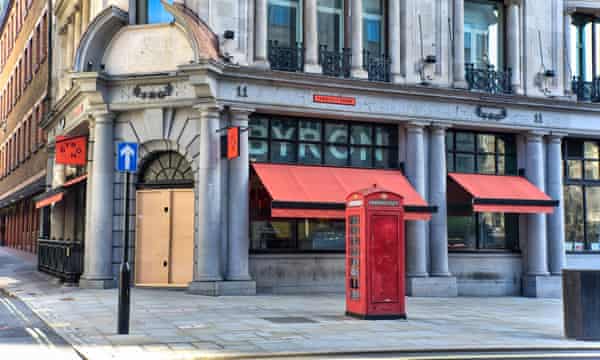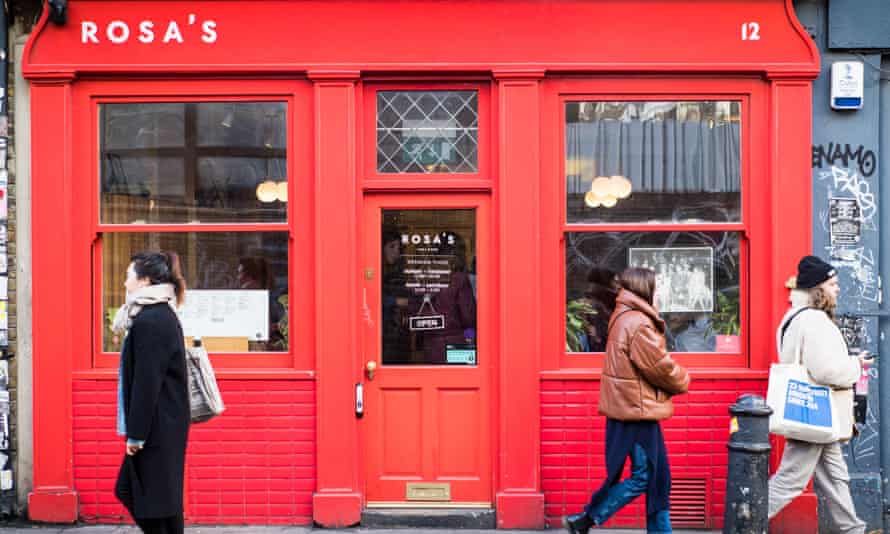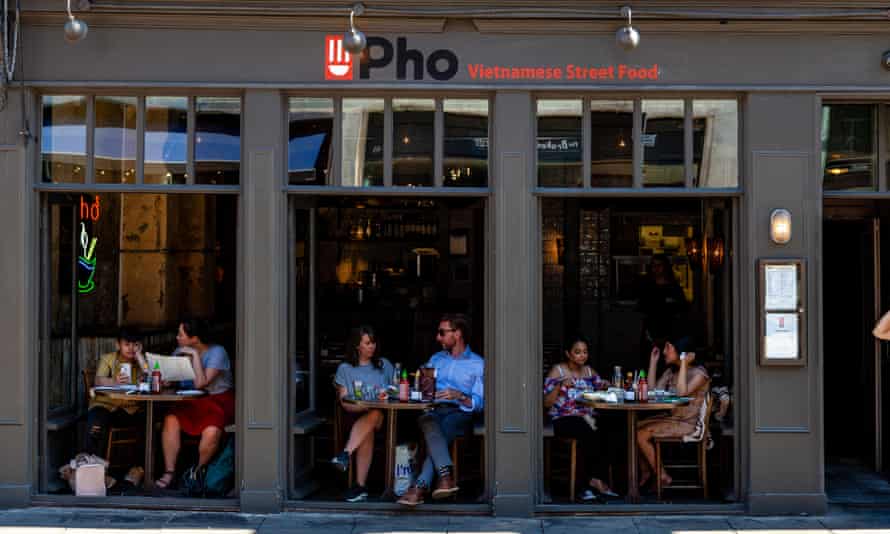As the pandemic slashed through the UK’s restaurants like a sharpened cleaver, one slice of the industry fared far worst than most: pizza and burger chains.
Byron, Gourmet Burger Kitchen and Italian chains Strada and Carluccio’s were among the casual dining brands forced to shed dozens of sites as repeated lockdowns and other Covid restrictions left the chains haemorrhaging cash.
A net 11.4% of chain restaurants, or about 700 outlets, have disappeared since March 2020, according to the Local Data Company (LDC) which monitors 3,000 areas across England, Scotland and Wales.
Italian and pizza restaurants chains shrunk by a net 22% or 448 sites during two years of the pandemic, while American-themed chains fell by a net 21% or 151 outlets, figures from the Local Data Company (LDC) reveal.
Despite the heartbreak for those made redundant, the celebrity chef Gordon Ramsay credited the Covid-19 pandemic with clearing away “crap” restaurants. Ramsay this week argued that there might now be a new beginning as the experience of lockdown, where families killed time by cooking more from scratch at home, as well as raising appreciation of well-made food.
In an interview with the former shadow chancellor Ed Balls in Radio Times, Ramsay described the shrunken chains as: “Well, just shitholes in a prime position and taking advantage because they’re in a great location, and they’ve got the footfall. But now we’ve wiped the slate clean, which is good.”

Ramsay should know about the perils of the pandemic: his own chain of 25 London restaurants lost £5.1m in the year to the end of August 2020.

The trade association UK Hospitality said almost 700,000 jobs were affected at the peak of the pandemic – a combination of job losses, plus roles that were not needed due to tourist seasons being heavily affected.
The clear-out reversed the effects of a desperate land grab fuelled by private equity cash over the previous four or five years, where customers were lured with generous discounts and vouchers, but left businesses locked into expensive sites, often too close to similar outlets.
The Restaurant Group, which owns Frankie & Benny’s, Garfunkel’s and Chiquitos, and the Casual Dining Group, which owns Café Rouge and Bella Italia, both closed dozens of outlets, rapidly exiting sites they might have planned to close over five or more years.
But finally, green shoots are emerging. The pandemic has cleared a path for new names which are rapidly expanding, including Pizza Pilgrims, Rosa’s Thai – which has plans for six more sites a year – and Shoryu Ramen, which is looking for franchise partners to expand beyond its current nine sites.
Independents have also stepped into the gaps left by the chains. The number of local restaurants has increased since March 2020 – up by 3.7% or 888 more according to LDC – as cheaper rents have made it easier for entrepreneurs to start new businesses.
Stefan Chomka, the editor of Restaurant magazine, says the pandemic has changed the balance of power between landlords and restaurateurs, opening the way for cheaper rent deals. “[Landlords] are much more willing to give smaller nimbler restaurant groups a go,” he says.

Paul Askew, the owner of The Art School fine dining restaurant in Liverpool opened a second outlet, Barnacle, in Duke Street Market in December just as the hospitality industry was hit by a fresh wave of cancellations prompted by fears of the Omicron Covid wave.
He says many good businesses failed because they had unhelpful landlords or their business insurance did not pay up but he was able to expand because he was offered rents linked to sales after another restaurant failed. “We took a gamble and it seems to have hopefully paid off,” he adds.
Askew says that despite difficulties with rising costs, staff shortages and the prospect of higher VAT the market has bounced back with “a tsunami of bookings” since reopening. “With disposable income cut, you might go out less and if you go somewhere it will be where they are going to give you a really good time with better service and better food.
Chomka sees small brands with fewer than five sites as the ones that will really benefit from the changes wrought by the pandemic as they can now offer “that young feel that landlords are really craving”. “They could double or triple their sites in a short amount of time,” he says.
He says “it is not about big brands any more” and landlords are looking to curate sites with more variety, and less familiar names creating space for a new wave of private equity-backed brands. Restaurants are also battling with food, wage and energy inflation, while household incomes are under intense pressure.

Peter Backman, an independent restaurant consultant, says that competition for cash is likely to be tougher as many of the private equity firms that were previously investing in restaurants had their fingers burnt. “A lot have pulled out and they probably won’t come back at least for a while,” he says.
But Graeme Smith at the consultancy Alix Partners, who works with restaurant investors, says interest is still there. In August, TriSpan ploughed money into the Vietnamese street food chain Pho, US fund Fortress recently bought Punch Pubs while Alchemy Partners bought Brasserie Bar Co, the company behind Brasserie Blanc and the White Brasserie foodie pubs.
He admits the days of expecting to rapidly roll out a brand to 400 sites are probably over but says there is “still a lot of interest” from private equity in the restaurant world.
Britons’ taste for takeaways during multiple lockdowns has driven a boom time for brands such as German Doner Kebab, Crosstown Donuts, the healthy eating brand Choppaluna – which has 60 sites in the pipeline – and the dessert specialist Creams which now has 100 outlets in partnership with local franchisees.
Backman says about 10-20% of restaurants’ business now tends to be made up of delivery income, with some opening dark kitchens or starting up new brands out of their existing kitchens to cater specifically for takeaways. The Azzurri Group, for example, uses spare capacity in its Zizzi and Ask Italian restaurants to supply its Coco di Mama takeaway business.
Sign up to the daily Business Today email or follow Guardian Business on Twitter at @BusinessDesk
Meanwhile, chains such as Zizzi and Leon are diversifying into supermarket ready meals or new locations such as drive-thrus and motorway service stations.
New ways of business are partly being driven by trade investors such as the Issa Brothers – who bought healthy takeaways group Leon Restaurants to complement their motorway services business and the supermarket chain Asda. Ranjit Singh Boparan, the food industry tycoon behind 2 Sisters Food Group, has also been snapping up troubled restaurant brands – including Giraffe, Ed’s Diner and Carluccio’s and Gourmet Burger Kitchen.
Chomka says that in straitened times these brands are “trying to sweat all their assets”.
“It’s no longer good enough to just open a restaurant and serve people.”






More Stories
Management Consulting Corporations – A Buddy In Need For Startup Firms
Finest Technological innovation Answer Vendors of 2018 – Seisan Consulting, LLC – Industry Era
Travel Tips For Consultants